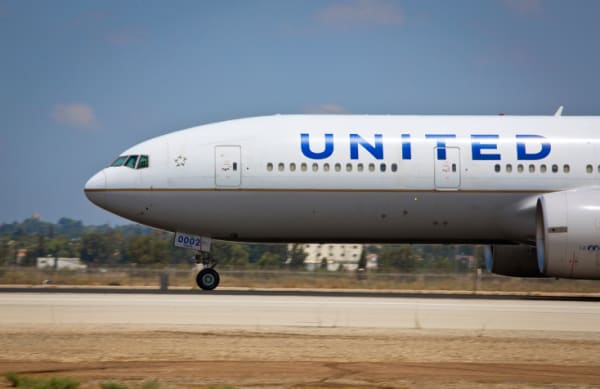View of a “UNITED” flight, an American airline, taking off from Ben Gurion International Airport. June 18, 2013. photo by Moshe Shai/FLASH90
Israel is currently in the throes of a second large flights suspension crisis in less than a year, caused by the Iranian threats to retaliate against Israel for its alleged assassination of Hamas leader Ismail Haniyeh in Iran’s capital Tehran.
Starting in August, dozens of airlines suspended their connections to Israel, citing fears of a regional escalation following the Iranian threats.
Despite the relative quiet over the past month, numerous airlines continued their suspensions, with United Airlines continuing its suspension until further notice, and American Airlines even announcing a blanket cancellation until March 2025.
Delta has canceled flights until September 30 but will continue to operate under an El-Al codeshare. This means that at the moment, only Israel’s main airline El Al is flying directly between the U.S. and Israel.
Over the past week, several airlines announced they will resume their flights, as Iranian threats have remained empty for the time being.
The Lufthansa Group, including Swiss, Lufthansa, Austrian Airlines, Brussels Airlines, and Eurowings, resumed flights to Israel on Sept. 5.
In addition, carriers such as Air France, Aegean, Bulgaria Air, Wizz Air, Air Europa, TAROM, FlyDubai, Etihad Airways, ITA Airways, LOT Polish Airlines, and Ethiopian Airlines, have also returned, according to Israel Hayom’s guide to airline cancellations.
Croatia Airlines, Vueling, and Air Baltic so far have not announced a return date for their services to Israel.
The Irish Ryanair canceled flights until October 26, and Air India will resume flights on October 24.
The second round of widespread cancellations, after a first round in the immediate timeframe following October 7, has raised eyebrows as nothing on the ground has changed, and the cancellation occurred only because of Iranian threats.
“One of the things that Iran is trying to accomplish is to isolate Israel economically. This is just another sign of that,” Sen. Lindsey Graham (R-SC) told Jewish Insider.
Rep. Ritchie Torres (D-NY), a strong supporter of Israel, turned directly to the U.S. airlines urging them to reconsider their flight suspensions “in order to prevent the appearance and the substance of discrimination against the Jewish State.”
In a letter to the CEOs of American Airlines, Delta Airlines and United Airlines, Torres wrote: “Airlines should be prohibited from effectively boycotting or otherwise discriminating against the world’s only Jewish State.”
“It is one thing to temporarily suspend air travel to Israel on security grounds as defined by the FAA. But to unilaterally suspend air travel indefinitely until mid-2025, as American Airlines has done, has the practical effect of a boycott,” he wrote.
“Given the arbitrary length of the suspension, one could be forgiven for thinking that the BDS movement had taken over the American aviation industry without anyone noticing, much less crying foul.”
“By what logic and in what universe is it safe for El Al to travel to Israel but too dangerous for American Airlines, Delta, and United to do so? It is worth noting that UAE airlines like Etihad, FlyDubai, and Wizz Air Abu Dhabi continue to fly to Israel without incident,” Torres asked.
“There is no transparency or reasoning behind the mass cancellations,” wrote Seth Frantzman, Adjunct Fellow at the Foundation for Defense of Democracies.
“The fact that Iran decides to threaten Israel should not become the new norm for travel chaos in Israel. The fact that Hamas chose to begin a genocidal war on Israel was not a good reason for international carriers to punish Israel for the crimes of Hamas.”
We recommend to read:


